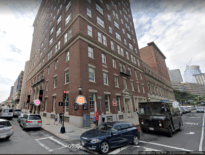Demand for biomanufacturing facilities is prompting a land grab in central Massachusetts by developers seeking sites where new drug candidates invented in Greater Boston’s ever-expanding lab facilities can be tested.
Properties in Boxborough, Marlborough, Worcester and the Devens business park are being prepped for the capital-intensive processes needed to accommodate drug manufacturing for early- and mid-stage life science companies.
“We saw a noticeable trend emerging with some of our existing tenant base, as well as others knocking on our door and looking for a place to manufacture their new medicines,” said Stephen Lynch, a principal at King Street Properties.
As early as 2018, Boston-based King Street Properties identified an opportunity to create a new division called Pathway tapping into the biomanufacturing market. It will provide design, permitting and construction management on 700,000 square feet of approved sites at Devens and is actively scouting property acquisitions within an hour’s drive of Cambridge, Lynch said.
Because of the highly specialized nature of the business, life science companies face the decision of designing and building their own facilities, or leasing space in third-party-owned facilities. With speed to market being a top priority, both developers and third-party contract manufacturers see an opportunity to build shell facilities ready for quick fit–outs and occupancy.
“The key considerations are cost, timing and control,” said Brian McKenzie, executive vice president with CBRE Consulting Group, who represents King Street in marketing the Devens sites. “These are very sophisticated environments for complex gene therapies and drugs, and having control of that environment is important.”
Ample Vacant Land, Few Promising Locations
While the Interstate 495 belt and beyond offer ample vacant land and lower acquisition costs than Boston’s core and inner suburbs, good biomanufacturing sites remain scarce, Lynch said. E-commerce developers pose stiff competition when acquiring commercial properties, and drug manufacturing requires robust water and sewer capacity that is limited in the outer suburbs. Devens, where Bristol-Myers Squibb has operated a large biologics manufacturing plant since 2009, was a logical choice, Lynch said.
Pathway acquired a pair of sites totaling 45 acres at Devens this summer, lured by the park’s fast-track permitting process that offers approvals in under 75 days. The first of five buildings totaling 700,000 square feet is already under construction at 45 Jackson Road, with scheduled completion in late 2021.
The 100,000-square-foot building could be leased to multiple tenants, ranging from early-stage companies that need as little as 10,000 square feet, to approximately 50,000 square feet for companies that have progressed to clinical trials, Lynch said. Future phases could accommodate existing tenants as they expand to large-scale production.
With over $2.5 billion in life science R&D facilities in Massachusetts and New York, well-capitalized King Street is building the first facility at Devens on speculation with its own equity and that of an undisclosed institutional partner, Lynch said. Building on spec gives King Street an advantage over competing sites that are seeking to secure tenants before breaking ground.

Central Massachusetts is staking its claim within the state’s ever-expanding life science industry as developers build biomanufacturing building shells to accommodate drug candidate testing and production. Webster-based Galaxy Life Science recently purchased a pair of sites at The Reactory, a redevelopment of the former Worcester State Hospital property. Image courtesy of Galaxy Life Sciences
Some Properties Suitable for Conversions
Brokerages are tracking more than 2 million square feet of requirements for biomanufacturing use in Massachusetts, including companies that include other states in their site searches, CBRE’s McKenzie said.
The demand level is prompting some developers to study conversions of suburban buildings from other uses. Single-story buildings with large floor plates and ample clear heights to accommodate mezzanine-level mechanicals and clean rooms are the ideal candidates, McKenzie said.
In Boxborough, German contract biomanufacturer Vibalogics plans to invest $150 million to retrofit a former Cisco Systems R&D facility into life science space by mid-2021, including a partial conversion to accommodate 30-foot clear heights.
And in Marlborough, Revance Therapeutics agreed to build a $105 million manufacturing facility employing 105 people with average wages of $105,000 after receiving a tax increment financing agreement from city officials in November. The 79,000-square-foot facility will be built on Campus Drive in the existing four-building, 531,916-square-foot Campus at Marlborough office park. Boston-based Greatland Realty Partners and Breed’s Hill Capital acquired the campus in June for $66 million.
Newark, California-based Revance Therapeutics will use the facility to produce an injectable product used in dermatology to treat frown lines.
Worcester’s Reactory Seeks to Keep Pace
The growth of the industry poses rising competition for a 46-acre Worcester property that’s the cornerstone of the city’s attempts to grab a piece of the biomanufacturing boom.
The Worcester Business Development Corp. has inked a pair of deals with WuXi Biologics, a Chinese contract manufacturer, and Galaxy Life Sciences, a Webster-based life science developer that recently broke ground on a speculative 95,000-square-foot manufacturing facility.

Steve Adams
WuXi has completed site work for its first building at The Reactory, a redevelopment of the former Worcester State Hospital property, and has an option to acquire an adjacent 4-acre site, said Craig Blais, CEO of the Worcester Business Development Corp. A $1.5 million city-funded project to upgrade utilities to the properties is under way.
Galaxy Life Sciences has acquired two properties and has an option to acquire the remaining three development parcels, which will require another $1.5 million in infrastructure upgrades, Blais said.
King Street Properties also had submitted a proposal for the parcels acquired by Galaxy Life Science, and the Boston developer’s aggressive plans for Devens are likely to pose a major rival for future tenants weighing their expansion options.
“We are a little concerned about the competition,” Blais said. “King Street is a great, great developer.”






